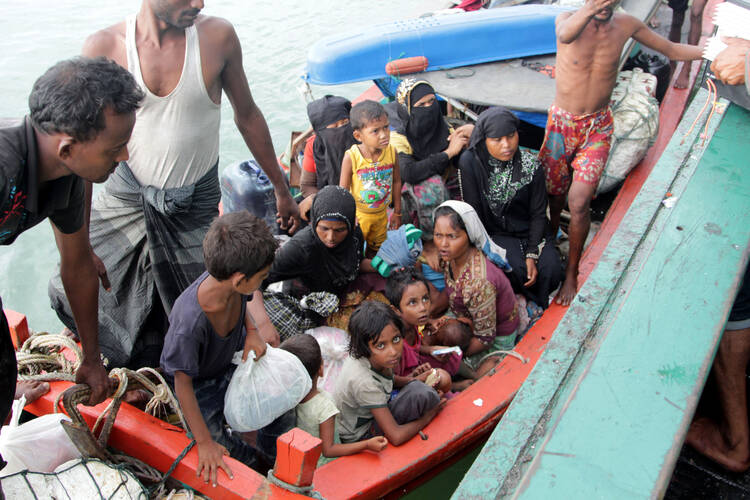Cardinal Charles Bo has asked the government of Myanmar to squelch hate speech and do more to help Rohingya refugees, many of whom have fled the country and are trapped at sea as countries refuse them entry.
"An immense tragedy is taking place on the seas of Southeast Asia. A new wave of boat people is adrift in the seas, forced to flee poverty and conflicts in Burma and Bangladesh," the Yangon cardinal said in a statement in late May.
"Men, women, and children are being exploited by unscrupulous traffickers. They are crammed into squalid barges and often die at sea. A new wound is being opened. Let mercy and compassion flow like a river in the land of Buddha," he said.
Referring to recent protests by hardline Buddhists and hostility shown by the government of the predominantly Buddhist country, the cardinal added: "We strongly urge the government not to allow speeches that promote hatred to subvert the glorious Burmese tradition of compassion. The people of Burma have a moral obligation to protect and promote the dignity of all human beings. A community cannot be demonized, and their basic rights such as identity, citizenship, and the right to exist as a community cannot be denied."
"Compassion and mercy are the two eyes of this nation, which allow a vision of peace and dignity. Let mercy and compassion flow like a river in our country," he said.
Thousands of Myanmar's Rohingya Muslims have been fleeing persecution at home, and some of their boats are being turned away by neighboring countries. Authorities in Thailand have found them locked in jungle camps, part of a human trafficking scam. The Associated Press has said that an untold number of refugees have died of starvation, sickness and abuse.
Pope Francis spoke about the refugees after praying the Regina Coeli May 24 at the Vatican.
"With deep concern I continue to follow the situation of numerous refugees in the Gulf of Bengal and the Andaman Sea," the pope said. "I appreciate the efforts of some countries willing to welcome these people, who are facing serious suffering and danger. I encourage the international community to give them humanitarian assistance."
In an interview with an Argentine journalist, Pope Francis spoke of situations that make him "weep inside."
"Like the other day when I saw what is happening to the Rohingya people" from Myanmar, who have piled on to boats seeking asylum, he said. "When they get close to shore, they are given something to eat, some water, then pushed back out to sea."
About 1.3 million Rohingya have been living in Myanmar's western Rakhine state, near the border with Bangladesh. Myanmar does not recognize them as an ethnic group or as citizens, but AP reports that Rohingya identify themselves as an indigenous Burmese ethnic group descended from Arab merchants who settled in South Asia from the eighth century onward.
Rohingya have limited access to education and medical care, cannot move around or practice their religion freely. AP reports that, in the last three years, attacks on Rohingya have left 280 people dead and forced 140,000 others into crowded camps, where they live under abysmal, apartheid-like conditions, with little or no opportunities for work.
In December, the U.N. General Assembly passed a resolution urging Myanmar to provide full citizenship to the Rohingya and to allow them to move freely throughout the country.








